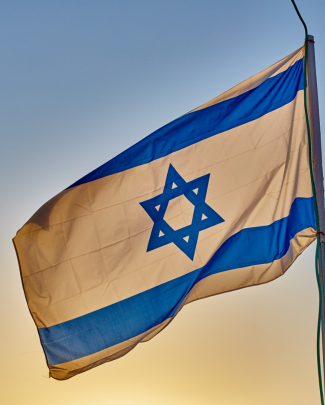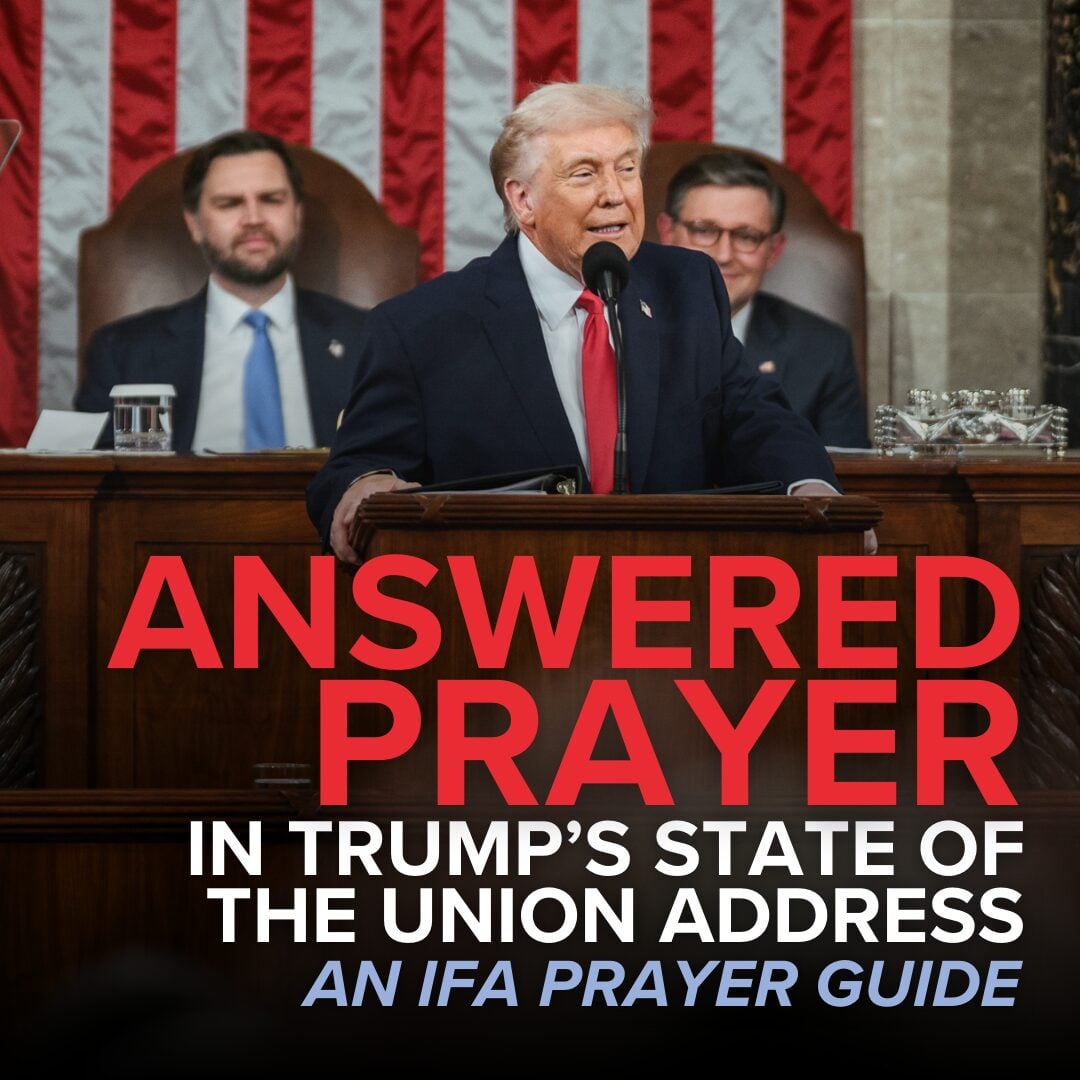We Are the ‘Whatsoever It Should Cost Us’ Generation
Anti-Israel Protestors Target Jewish Campus Organizations
Republicans Seek Answers on Attempted Military Base Breach
Football Player Doxxer Fired
Why We Should Pray for America
We Are the ‘Whatsoever It Should Cost Us’ Generation
God’s promises are the basis of His relationship with humanity. Those promises take a form that He calls “covenant,” a binding agreement between parties to do or to keep from doing some specific thing. In the Bible, covenant is the framework that reveals God’s love to humanity.
Get prayer updates from IFA.
The Initial Covenants
God’s very first covenant, with Adam and Eve, was inherent in the natural creation. The expectation was that humanity’s obedience would fulfill God’s creation mandate to be fruitful, multiply, and fill the earth, and to be stewards of God’s creation. Adam and Eve, in turn, would enjoy God’s presence and the continued blessings of His fruitfulness, peace, joy, and eternal life. But Adam and Eve broke that covenant, ushering sin into the world and causing a breakdown in our relationship with God.
God’s covenant with Noah was the first covenant of grace, in which God promised to safeguard the creation in continuing love and care for humans, animals, and the entire natural order. Remarkably, God made this covenant in spite of human sinfulness, not in hope that humanity would become less evil through Noah and his descendants, but solely out of His love for the creation.
We’re allowed to overhear God’s thoughts:
“ … Never again will I curse the ground because of humans, even though every inclination of the human heart is evil from childhood. And never again will I destroy all living creatures, as I have done. As long as the earth endures, seedtime and harvest, cold and heat, summer and winter, day and night will never cease” (Genesis 8:21–22 NIV).
After the flood, the curse upon the ground resulting from Adam’s sin was removed, and God’s promise of new blessing continues to this very day, until the coming of the new heavens and new earth.
While the Noahic covenant was God’s promise to all the earth, His covenant with Abraham was a promise to one particular family. In time, this family became a nation (Israel) whose purpose would be to shine God’s light into the world. Here is what God promised Abraham:
“I will make you into a great nation, and I will bless you; I will make your name great, and you will be a blessing. I will bless those who bless you, and whoever curses you I will curse; and all peoples on earth will be blessed through you” (Genesis 12:2–3 NIV).
“When Abram was ninety-nine years old, the Lord appeared to him and said, “I am God Almighty; walk before me faithfully and be blameless. Then I will make my covenant between me and you and will greatly increase your numbers.” Abram fell facedown, and God said to him, “As for me, this is my covenant with you: You will be the father of many nations. No longer will you be called Abram; your name will be Abraham, for I have made you a father of many nations. I will make you very fruitful; I will make nations of you, and kings will come from you. I will establish my covenant as an everlasting covenant between me and you and your descendants after you for the generations to come, to be your God and the God of your descendants after you” (Genesis 17:1–7 NIV).
Abraham, Moses, David, Christ
Abraham would become the ancestor not only of the greatest kings of Israel — David and Solomon — but even of the highest king of heaven and earth: Jesus Christ. Every one of us shares in this covenant. Paul wrote: The promises were spoken to Abraham and to his seed. Scripture does not say “and to seeds,” meaning many people, but “and to your seed,” meaning one person, who is Christ (Galatians 3:16).
All of the promises to Abraham were fulfilled in Christ, and all of us who believe in the Lord Jesus are spiritual children of Abraham through Christ. And God called Abraham not because his faith made him “worthy,” but because God loved him. Our faith in Christ is why God calls us to be partners with Him in building the kingdom of God. God calls us not because our faith makes us worthy, but because He loves us.
God’s covenant with Moses too was an act of His love. Far from being an oppressive list of mere dos and don’ts, the Ten Commandments are a framework for living within the covenant of God’s love as we express it toward God, our families, and the wider community. Perhaps if we were to state the commandments in terms of love, we would better understand and keep them:
“If you love Me, then you will have no other gods before or besides Me; if you love your father and mother, then you will honor them; if you love your spouse, then you will be faithful to your marriage covenant; if you love your neighbor, then you will not kill, steal, lie, or covet your neighbor’s spouse or possessions.”
Jesus perfectly summarized the Ten Commandments in His answer to the Pharisees: … “ ‘Love the Lord your God with all your heart and with all your soul and with all your mind.’ This is the first and greatest commandment. And the second is like it: ‘Love your neighbor as yourself.’ All the Law and the Prophets hang on these two commandments” (Matthew 22:37–40 NIV).
The final Old Testament covenant is the one God made with King David. He spoke to David through the prophet Nathan: “‘The LORD declares to you that the LORD himself will establish a house for you: When your days are over and you rest with your ancestors, I will raise up your offspring to succeed you, your own flesh and blood, and I will establish his kingdom. He is the one who will build a house for my Name, and I will establish the throne of his kingdom forever. I will be his father, and he will be my son. When he does wrong, I will punish him with a rod wielded by men, with floggings inflicted by human hands. But my love will never be taken away from him, as I took it away from Saul, whom I removed from before you. Your house and your kingdom will endure forever before me; your throne will be established forever’” (2 Samuel 7:11–16 NIV).
Many of the prophets interpreted the Davidic Covenant in messages of hope to the Israelites during the dark days of the evil kings and the exile. And all these prophecies and the Davidic Covenant would be fulfilled in Jesus, the true Son of David.
The Ultimate Covenant
In time, God made a New Covenant with humanity, fulfilling the provisions of all the covenants that came before. God knew that this New Covenant could not depend upon the ability of the people to keep its demands. So God wrote this covenant not on tablets of stone, but upon people’s hearts. He knew that this covenant must first become a way of believing in the heart and thinking in the mind before it could become a way of living. The New Covenant required the people to receive a new heart and mind. This could only happen if God Himself were resident within them — through His Holy Spirit. In the New Covenant, God Himself did what the earlier covenants could not do: He forgave His people their wickedness and remembered their sins no more.
The New Covenant is God’s ultimate promise of love. And keeping this covenant cost Him dearly. God so loved the world that He came here — first in Jesus, His only Son, to restore His love relationship with the world; and then in the Holy Spirit, to restore His love relationship with humanity. This is what Jesus accomplished on the cross. As Paul wrote: … God was reconciling the world to himself in Christ, not counting people’s sins against them … (2 Corinthians 5:19 NIV).
Covenants With Church and State
In the mid-16th century, Cambridge University became the center of discourse concerning reformation of the Church of England. Some thought the Church could be reformed from within through the “purifying” of its errors. Others believed that no reformation from within could ever bring true renewal, but would only be like putting a new patch on an old garment. Separatist church leader Robert Browne believed that only a complete separation from the Church of England would bring about the needed reforms, because in England the Church and the state were inextricably entwined, and purification could never result from such an arrangement.
Browne looked to the biblical model of covenant as the means of uniting believers to God and each other by willing consent, not by compulsion of the state. Being thus united, a church could recognize its duty to God the Father, to Christ as lawgiver and ruler of the Church, and to the work of the Holy Spirit.
The polity Browne wished to advance was democratic in nature, with members choosing their officers and pastors — after they’d first been chosen by God through the inward calling of divine providence. Church leaders were not to be masters and judges, but examples of the love of Christ in action. Browne believed that local churches, although each a complete and discrete part of the Body of Christ, needed to be connected for fellowship, wisdom, and discernment.
Browne’s picture of that covenant relationship of church members extended to his vision of the state. Democracy in one field extended to the other, as Browne’s theory implied that all governors should rule by the will of the governed.
Browne’s brilliant brushworks of church polity influenced the forming of our own nation, beginning with the Plymouth Colony. Some Cambridge students became followers of Browne, preaching separatist views from the pulpits of Anglican churches in some parts of England. Richard Clyfton was one such pastor — whose congregation included William Brewster and William Bradford, and whose underpastor was John Robinson. Clyfton was stripped of his pastorate by the Anglican Church, and an underground church was formed at Brewster’s home in Scrooby Manor. Here in 1606, the Scrooby congregation formed under a covenant — the first ever initiated by man with God, and not, as in biblical times, by God with man.
Whatsoever It Should Cost
The Scrooby covenant reads: As the Lord’s free people, we join ourselves, by a covenant of the Lord, into a church estate, in the fellowship of the Gospel, to walk in all His ways made known, or to be made known to us, according to our best endeavors, whatsoever it should cost us, the Lord assisting us.
Such was the Scrooby congregation’s faith and commitment to God that they courageously initiated a covenant claiming God’s promises to make known to them how they were to go. They knew they were a free people in Christ: … where the Spirit of the Lord is, there is freedom (2 Corinthians 3:17). They exercised their freedom to join in covenant relationship with God and each other, forming a discrete body in Christ, without attachment to ecclesiastical authority. The Word of God was their compass, guiding their practice of faith and daily living in community — whatsoever it should cost them.
And it did cost them: their homeland; their fortunes; separation from their families remaining in England and Holland; a difficult ocean crossing at the start of winter — not knowing if they would even reach their destination, and not knowing what dangers and perils that destination held for them. Of the 102 Mayflower passengers, half died during that first winter. Yet, when given the chance to return to England in the spring, not one of them desired to go.
They saw themselves as a whatsoever it should cost us generation who, like Abraham, had faithfully left their homes and families to follow God to an unknown land. That tiny Mayflower vessel became the Noah’s ark of their salvation.
The Scrooby Covenant was precursor to yet another important covenant: the Mayflower Compact. Following the tenets of their covenant and the guidance of their pastor, John Robinson, these Pilgrims created the compact, a revolutionary act of forming a new government without permission from the king. The ideas in the compact foreshadowed the Declaration of Independence. I believe it is fair to say that without the Scrooby Covenant, there would have been no Mayflower Compact.
We Americans are privileged to live in a nation founded by free people. The first words of the Scrooby Covenant declared a freedom that came from God. This is our legacy. We have a sacred duty to preserve and tell the story of these free covenant people who followed God whatever the cost.
Father, the heavens proclaim Your glory and righteousness! Even today You are gathering to Yourself a covenant people. And You promise that when we call upon You in the day of trouble, You will faithfully deliver us! You have always fulfilled Your covenant promises. Thank You for those who came before us and upon whose shoulders we now stand. May future generations be able to stand upon our shoulders. May Your covenant with our nation be the cry of our hearts, for such a time as this. Amen!
Share prayers here for restoration of America’s covenant with God, and your thoughts about covenant blessings.
(Photo Credit: Intercessors for America)
Partner with Us
Intercessors for America is the trusted resource for millions of people across the United States committed to praying for our nation. If you have benefited from IFA's resources and community, please consider joining us as a monthly support partner. As a 501(c)3 organization, it's through your support that all this possible.


We use cookies to ensure that we give you the best experience on our website. If you continue to use this site we will assume that you are happy with it. Privacy Policy





Comments
This reminds me of what we veterans call “signing the check” – taking the oath of allegiance when we are inducted into the U.S. Military Service. “No matter what…”
Please check “Generation Last” by my friend Les Lawernce
https://elishavision.com/
LORD, I pray that we will be prepared and be filled with the Holy Spirit so we can discern what is needed in any given situation.
I pray that we will not cower, but be bold as a Lion and full of wisdom. You are our God, in Jesus name.